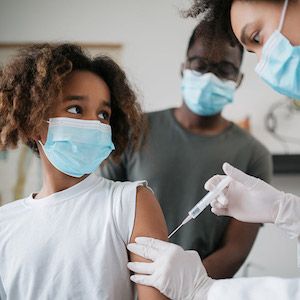Article
MIS-C Cases Rare Among Pediatric Patients Vaccinated Against COVID-19
Author(s):
Over 21 million children and adolescents aged 12–20 years had received 1 or more doses of a COVID-19 vaccine, amounting to 1 reported case of MIS-C per million vaccinated individuals in this age group.

A new observational study of children and adolescents who had received at least 1 COVID-19 vaccine dose found that reported cases of multi-system inflammatory syndrome (MIS-C) were rare, and that the reporting rate of cases of MIS-C without evidence of SARS-CoV-2 infection was 0.3 cases per million vaccinated persons in this age group.
The investigation, which was published in The Lancet Child & Adolescent Health journal, found that the MIS-C case rate in vaccinated children and adolescents aged 12-20 years in the US was substantially lower than previously published estimates in unvaccinated individuals aged 12-20 years old who had been infected with COVID-19 during April to June 2020.
The pediatric inflammatory multi-system syndrome is a rare condition associated with COVID-19 that was first recognized in April 2020. It is an immune overreaction thought to occur approximately 2 to 6 weeks after a COVID-19 infection in children and adolescents. Symptoms include rash, fever, eye redness, and gastrointestinal symptoms and can lead to multi-organ failure.
Reporting of possible cases after vaccination is required under COVID-19 vaccine emergency use authorizations, which prompted investigators from the current study to evaluate MIS-C cases in children and adolescents aged 12 to 20 years reported during the first 9 months of COVID-19 vaccination rollout in the US.
A team of specialist doctors and epidemiologists examined 47 reports of potential MIS-C illness that were reported between December 14, 2020 and August 31, 2021.
Of these 47 reports, 21 fit the Centers for Disease Control (CDC) MIS-C criteria. Case reporting rates were calculated using CDC national vaccine surveillance data on the number of individuals aged 12-20 years.
Out of the 21 cases of MIS-C, 15 had evidence of past or recent infection with the COVID-19 virus.
Over 21 million children and adolescents aged 12–20 years had received 1 or more doses of a COVID-19 vaccine, amounting to 1 reported case per million vaccinated individuals in this age group.
Crucially, the investigators stressed that they were unable to determine if vaccination contributed to the MIS-C illness in these rare cases.
Considering that MIS-C was first identified during the pandemic, no baseline rate of inflammatory illnesses in children and adolescents with an unidentified cause existed prior. The team noted that it was possible some identified cases had other unrecognized inflammatory conditions that occurred after vaccination.
Of the 15 pediatric patients with past COVID-19 infection, 3 were diagnosed with MIS-C outside of the typical 2-6 week timeframe.
Of the 21 individuals who were hospitalized, 12 were admitted to an intensive care unit. All individuals were discharged home.
Additionally, all individuals with MIS-C in the study received the Pfizer-BioNTech COVID-19 (BNT162b2) vaccine. At the time, this was the only COVID-19 vaccine authorized in the country for use in those younger than 18 years.
A total of 11 individuals received 1 dose and 10 received 2 doses before the illness onset, and the median time from dose to hospitalization was 8 days and 5 days, respectively.
Dr. Anna R. Yousaf of the US Centers for Disease Control and Prevention (CDC) noted that clinicians and researchers are still learning about MIS-C during the pandemic, and that the current investigation “highlights the challenges in diagnosing MIS-C, the importance of considering alternative diagnoses, and the need to monitor for MIS-C illness.”
“Our results suggest that MIS-C cases following COVID-19 vaccination are rare and that the likelihood of developing MIS-C is much greater in children who are unvaccinated and get COVID-19,” Yousaf said in a statement. “COVID-19 vaccination is recommended for everyone aged 5 years and older in the United States for the prevention of COVID-19.”





